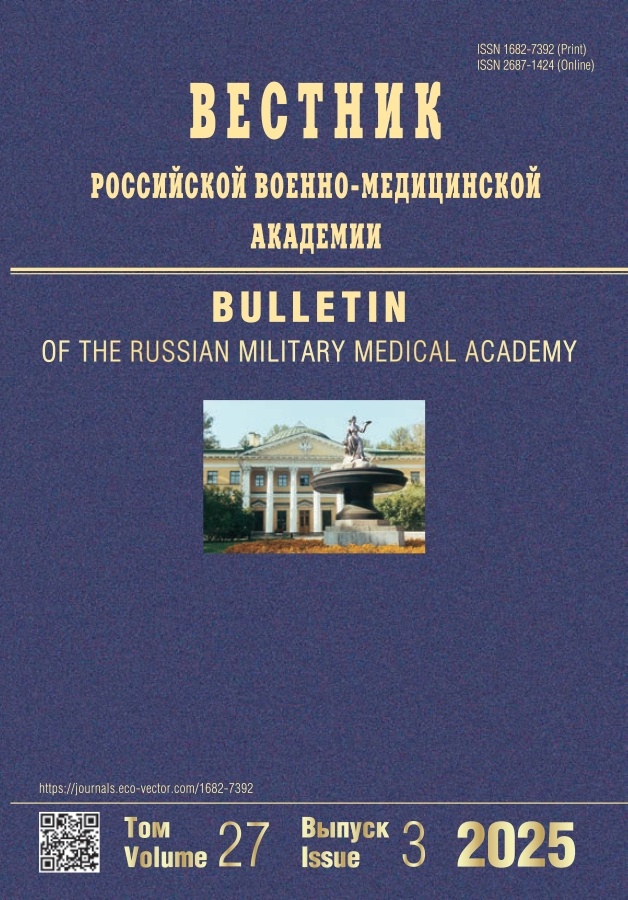Pathogenetic factors of trauma and post-traumatic immunodeficiency
- 作者: Alexandrov V.N.1,2, Kondratenko A.A.1, Mikhailova E.V.2, Kromsky S.V.2, Sigareva L.P.2, Eliseeva M.I.1, Pak N.V.1, Gorichnyi V.A.1
-
隶属关系:
- Military Medical Academy. S. M. Kirov
- Saint Petersburg State Pediatric Medical University
- 期: 卷 22, 编号 2 (2020)
- 页面: 110-114
- 栏目: Articles
- URL: https://journals.rcsi.science/1682-7392/article/view/50055
- DOI: https://doi.org/10.17816/brmma50055
- ID: 50055
如何引用文章
全文:
详细
It is well known that the severe condition of patients can be caused not only by shock, but either by epiphenomenon of post-traumatick shock, mestly pulmonary, quite often ending by death, as a manifestation of a successful treatment- resistant secondary post-traumatic immunodeficiency. On our deep persuasion, based on the analysis of literature, and afterwards own experimental data, pathogeny of post-traumaticimmunodeficit at the level of organism and according to its pathogenetic prophylaxis can not be unsealed without the analysis of reaction of the immune system on the pathogenetic factors of trauma: 1) inadequate (foremost pain) impulsation from the damaged fabrics; 2) blood-plasma loss 3) entering blood of bioactive substances; 4) hypoxia. What are the immunomodulatory effects of these factors, not at all, but in case of specific mechanical injury? What is the specific contribution of each factors to the development of immunosuppression in case of specific injury, which one is the main pathogenetic factor in the pathogenesis of post-traumatic immunodeficiency? There are no publications about the specific role of known pathogenetic factors of trauma in the formation of post-traumatic immunodeficiency. The available data gives an idea about the role of pain afferentation, stress, blood loss, toxemia, hypoxia in modulating the immune response in general, regardless of any type of trauma, and the primary changes in the immune system of patients after assistance, including surgical intervention bearing the risk of developing immunosuppression along with drug therapy. The study of these problematic issues of the pathogenesis of post-traumatic immunodeficiency at the system level in the context of severe mechanical trauma experimental model is provided with sufficient understanding of significance of urgent and adequate assistance in the context of ideas about the role of pathogenetic factors of trauma in the pathogenesis of post-traumatic immunodeficiency.
作者简介
V. Alexandrov
Military Medical Academy. S. M. Kirov; Saint Petersburg State Pediatric Medical University
编辑信件的主要联系方式.
Email: vmeda-nio@mil.ru
俄罗斯联邦, Saint Petersburg; Saint Petersburg
A. Kondratenko
Military Medical Academy. S. M. Kirov
Email: vmeda-nio@mil.ru
俄罗斯联邦, Saint Petersburg
E. Mikhailova
Saint Petersburg State Pediatric Medical University
Email: vmeda-nio@mil.ru
俄罗斯联邦, Saint Petersburg
S. Kromsky
Saint Petersburg State Pediatric Medical University
Email: vmeda-nio@mil.ru
俄罗斯联邦, Saint Petersburg
L. Sigareva
Saint Petersburg State Pediatric Medical University
Email: vmeda-nio@mil.ru
俄罗斯联邦, Saint Petersburg
M. Eliseeva
Military Medical Academy. S. M. Kirov
Email: vmeda-nio@mil.ru
俄罗斯联邦, Saint Petersburg
N. Pak
Military Medical Academy. S. M. Kirov
Email: vmeda-nio@mil.ru
俄罗斯联邦, Saint Petersburg
V. Gorichnyi
Military Medical Academy. S. M. Kirov
Email: vmeda-nio@mil.ru
俄罗斯联邦, Saint Petersburg
参考
补充文件







